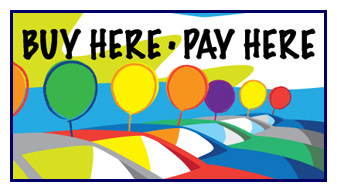A trio of state legislators have introduced legislation aimed at "Buy Here Pay Here" dealerships in California. These dealerships, where used cars are sold at a marked up price with loans that have abnormally high interest rates, are often used by people of lesser means as a last resort to get a car. These dealerships not only sell cars, but provide their own financing, creating two ways to benefit from the overpriced sale of a used car.
Last year, Ken Bensinger at the Los Angeles Times wrote a three part series exposing some of the business practices of these dealerships that create extra hardship for disadvantaged car buyers. This year, he has continued to follow-up on the issue as these bills were introduced and begin to move in the legislature. Here is a brief explanation of each piece of legislation:
A.B. 1447, Introduced by Assemblyman Mike Feuer (D-LA)
A.B. 1447 would actually change three parts of the business strategies of Buy Here Pay Here dealerships. First, dealers would be required to post the selling cost of the vehicle on the body of the vehicle. This would prevent dealers from setting prices at the negotiating table based on their estimate of what the seller could afford. The legislation also prohibits Buy Here Pay Here dealers from hasassing references for the buyer after the sale, requiring cash payments in person from drivers and disabling and tracking cars with GPS systems of payments are late.
“This industry preys on people who have no other options for getting a car,” said Feuer. “In many parts of our state, auto travel is the only way for parents to get to work on time, or to pick their kids up from school. Instead of helping Californians get back on their feet by providing needed transportation, these dealers are promoting an endless cycle of debt and joblessness.”
Critics of Feuer's legislation either argue that instead of passing laws to regulate the entire industry the state should focus on supporting existing laws or that the law is written so broadly that it applies to legitimate car dealerships who include LoJack with their car sales. Bensinger talked to several opponents in his piece for the Los Angeles Times on A.B. 1447.
S.B. 956, Introduced by Senator Ted Lieu (D-LA)
Senator Lieu's legislation focuses on the lending practices of the dealerships instead of the car sales. By handling financing in house but being licensed as a car dealer, Buy Here Pay Here dealerships were able to get around many state financing laws and consumer protections. Lieu's legislation would:
- Impose regulations on dealers offering Buy Here, Pay Here installment loans by requiring them to obtain a California Finance Lender’s license, which would provide consumers with an array of protections.
- Limit used-car installment loans to a maximum 17.25 percent interest, which would give California the strongest cap in the nation.
- Change the way Buy Here Pay Here used car dealers are able to repossess vehicles to include grace periods and make it easier for buyers to reinstate a repossessed car.
"Unscrupulous dealers are pushing these types of previously unregulated loans to sell cars for far beyond market value, at interest rates as high as 30 percent," explains Lieu. "They need to either find a conscience or display a sign: Rip-offs R Us."
Representatives of the industry are arguing that Lieu's legislation will make it difficult for dealers to sell to people with bad credit. To here their argument, read the bottom of Bensinger's article on S.B. 956.
A.B. 1534, Introduced by Assemblyman Bob Wieckowski (D-Fremont)
Wieckowski's legislation seeks to reduce the amount that dealers would mark-up their vehicles by arming buyers with information outlining the real value of the vehicle. A.B. 1534 would require dealers list a value for the car based on a third-party valuation source, such as Kelley Blue Book or the NADA Guide. The value would take into account the car's model year, condition and mileage. While it would provide knowledge to the buyer, it wouldn't place any restrictions on what the car could be sold for.
This legislation is receiving the same argument from Buy Here Pay Here representatives, that any restrictions on their industry will reduce people of lesser-means' ability to have access to a car. It's also receiving some more credible blowback from dealers worried that the wording of the law would require all dealers of used vehicles to be constantly updating stickers and signage to reflect the new prices.
The automobile industry is expected to weigh in on all three pieces of legislation, but all three bill authors remain optimistic that some legislation regulating this vampire industry will make it to the Governor's desk. That's the value of having a paper with the reach of the Times shine the light on an industry that is doing more harm than good, no lobbying effort will ever be able to turn that light back off.






